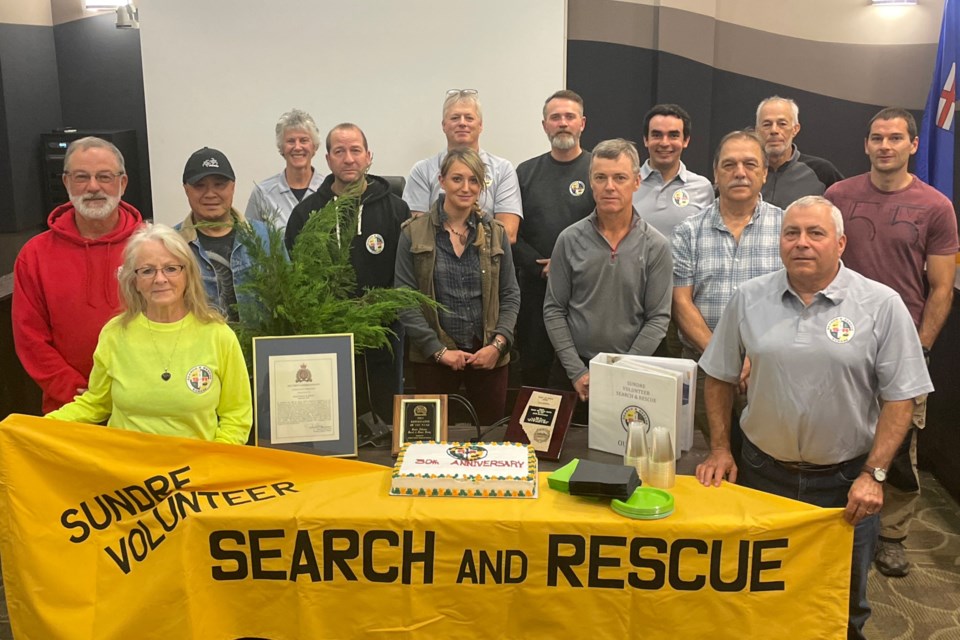SUNDRE – The rapid evolution of technology over the past few decades has vastly improved the efforts of search and rescue groups, and the growing impacts of an increasingly destabilized climate will shape the future direction in terms of the focus of training shifting more toward preparing to respond to civil emergencies.
Only the second such organization to have incorporated in Alberta back in the 1990s – the first being based out of Rocky Mountain House – the Sundre Volunteer Search and Rescue Association observed its milestone 30th anniversary on Sunday, Oct. 15 at the municipal council’s chamber.
And the group’s senior search manager, former president and currently serving treasurer, has been around almost that entire time with no intention of stepping away any time soon.
Roger Tetreault told the Albertan that the organization was born of a grassroots effort that ultimately led to the association officially being incorporated in 1993. About two years later, he decided to get involved following a conversation with a friend who had been among the founding members.
With an existing affinity for working and playing outdoors combined with past leadership and organizational experience after some time with the provincial government, it just seemed like a natural fit and he hasn’t looked back since.
“It stuck with me for 27 years,” Tetreault said, adding he has no immediate plans to step down.
Throughout that significant span of time, he has seen and personally experienced more than a few changes; not just with regards to policies and procedures, but especially pertaining to technology and tactics.
“There’s always politics and procedures, but we don’t often have much control over it,” he said.
“But the big thing that changed, is technology. Obviously, in 30 years since we’ve been in existence, there was no such thing back then as cellphones and GPS units,” he said.
“Now, with the advent of GPS technology and better cell coverage, we’re definitely getting fewer and fewer lost people because they can communicate better and know where they’re at.”
That’s of course not to say people don’t still end up in need of being rescued, as they sometimes either get hurt or experience medical issues in fairly remote areas that will require a response.
“So, that doesn’t go away,” he said.
Another ground-shifting game-changer brought on by GPS technology is the ability to more accurately map out an area, he said.
“On a large scale search, with all our members having GPS units – or that capability, whether it’s on their cellphone or a separate GPS unit – is being able to map areas where we’re searching,” he said.
“That’s huge…you can easily map out the areas that were covered by searchers and which areas still needed to be searched,” he said.
“It’s a really great tool for search managers to be able to plan the tactics around that.”
Additionally, drones have ushered in a new era enabling a far more affordable bird’s eye view than helicopters, he said.
“Our team itself does not own a drone or have plans to have a drone in the future,” he said.
But the devices are so widespread and readily available that the association doesn’t need one, he added.
“A lot of the agencies we’ve worked with – whether it’s the fire department, county, RCMP – drones are out there. Everybody’s got them, whether they’re personally-owned or with one of the other agencies,” he said.
“So, that’s another great asset for a quick overall eye in the sky.”
And looking forward, change seems to be the one constant.
Tetreault anticipates search and rescue organizations will over the coming years begin to shift their training focus on responding to civil emergencies.
“As far as looking into the future, it’s pretty obvious that Alberta just came off an unprecedented season of natural disasters – wildfire and flood – and not just in Alberta, but across Canada,” he said.
“I think looking forward, that’s where our focus will probably be on our training: is how can we assist our local municipal governments, whether it’s the town or the county, provincially and federally, as well to have teams that are trained and can be tasked for civil emergencies.”
That might for example involve training search and rescue teams to be ready to help out with evacuations or provide helping hands as needed for the overhead teams operating emergency command centres, he said.
“We are going to focus a lot of training on civil emergency response and disaster response.”
The Oct. 15 gathering was also the association’s annual general meeting. But there were no major changes to the executive with essentially the same core group of members in leadership positions remaining the same, he said.
About 15 members plus three potential new recruits in training attended the quiet get-together that included cake.
“That was good to see we’re getting a little bit of new interest in the team,” he said.
Team historian Helen Jackson had also brought along the association’s scrapbook, which includes a collection of news articles as well as awards and certificates and thank-yous received over the years.
The Sundre RCMP detachment’s acting commander Sgt. Randy Poon also attended out of an interest to learn more about the history of the group and what it has done for the community.
“It was nice to get a thank you from him as well,” said Tetreault.
Offering some parting thoughts, Tetreault expressed appreciation for the community’s unwavering support over the decades, and added the association had recently received a new ATV courtesy of a donation from Sundre Forest Products.
“That’ll be put to use in our training and operational activities,” he said.
Anyone interested in learning more about the association and perhaps joining its ranks is encouraged to either email [email protected] or send a message through the group’s social media page.
“We’re always open to new members.”



